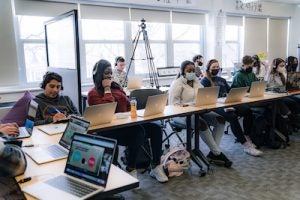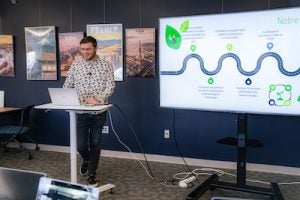Last week students in a French course won a virtual environmental challenge hosted by URI’s partner institution, the University of Rennes 2 in Rennes, France. Focused on how to make university communities more sustainable and conducted entirely in French, the competition included two teams from URI and three teams from the University of Madrid. The winning team – including group members Temitope Aina, Rachel DiMartino, Geo Espinoza, Aidan Kindopp, Gavin O’Connell, Justine Thiare, and Allison Vanasse – focused their project on creating a better composting program for URI.
“URI does not currently have a composting system in place for students to compost directly in the dining halls or in their residence halls,” says Allison Vanasse, a cell molecular biology and French double major. “We created a system that would only take a few seconds for students to separate the waste on their plate. With this increased compost, we could partner with local farmers and create a cycle of producing compost for the farms and buying back locally grown products to feed students at the dining halls. Our project really sought to use composting in a way to benefit the environment, the university, and the students attending URI.” The team also worked on outreach and education efforts directed at students on the basics of composting and how composting as a practice can improve our community environment. A video teaser of their project can be viewed here.

“A highlight of this experience for me was to think about the future and how composting can be used as a means for sustainability and regional food security.” says Aidan Kindopp, a chemical engineering major who is enrolled in the French International Engineering Program. “This project allowed me to learn a new subset of French vocabulary in the realm of sustainability and environmental issues.” Rachel DiMartino, a film/media and French double major, notes that she enjoyed how each group member was able to contribute a different skill to achieve one cohesive project. “We’re all studying different topics in addition to studying French so it was interesting to see them all come together,” she says. “I was most involved in the artistic side of this project. I created the video trailer and the infographics that’ll be put in buildings around campus. I combined my video editing skills and graphic design skills with my French major to create the art!”

The competition involved several phases: to begin, the teams created logos, conducted research, and worked on visuals and video teasers of their proposed projects. In the quarterfinal, they presented their projects as a group. In the semifinal, the best video teaser was selected. And in the final round, a TED-talk style presentation was given live on Zoom by one student from each group. Throughout each step, graduate students in Rennes from the Université de Rennes 2 Masters program in Didactique des langues/Language Didactics served as mentors. This was URI’s first time participating in the challenge. “I hope that other students can hear about this and be inspired to propose their own solutions in the hopes of making URI a more sustainable and ecologically friendly community,” says Vanasse.
-By Anna Gray

